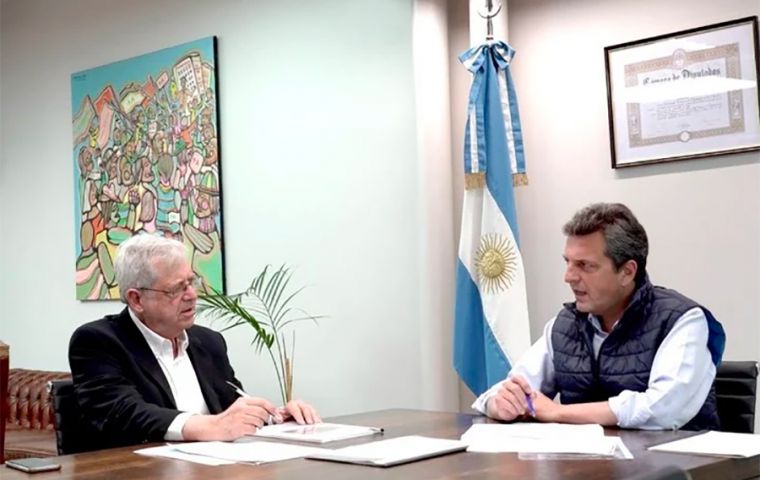MercoPress. South Atlantic News Agency
Massa appoints Argentina's new Secretary of Economic Programming
 Rubinstein has been very critical of every government for which he later worked
Rubinstein has been very critical of every government for which he later worked Argentina's Superminister Sergio Massa, who is not an economist himself despite having been entrusted with what used to be 3 Ministries (Economy, Agriculture and Production) Sunday confirmed through social media Gabriel Rubinstein would be joining his team as Secretary of Economic Programming.
“We had to wait for who we chose to resolve a family issue and dissolve his contractual responsibilities incompatible with public office,” Massa explained. He added Rubinstein would officially take up his job Monday.
Rubinstein will have to deal with the government's goals of fiscal consolidation, reduction of subsidies, and the fulfillment of the clauses agreed upon with the International Monetary Fund (IMF).
“I want to thank Sergio Massa for the trust he has placed in me. With professionalism and passion, I will do my best to face the challenges we have to face,” said Rubinstein on Twitter.
“I would also like to highlight the government's willingness to incorporate me into the team despite the offensive comments I made on social networks, which were not appropriate,” he added.
Rubinstein used to be a member of then-Economy Minister Roberto Lavagna's team in the early 2000s under Presidents Eduardo Duhalde and Néstor Kirchner and was also involved in negotiations with the IMF. He had been critical of Cristina Fernández de Kirchner, whom he accused of corruption, due to which his appointment had been put on hold.
Rubinstein has a degree in economics from the University of Buenos Aires. He was an advisor to the Finance Secretariat headed by Guillermo Nielsen between 2002 and 2003 and was part of the group in charge of negotiating with the International Monetary Fund and private creditors after the 2001 default. In 2004 he became Executive Director of the Buenos Aires Stock Exchange and in 2005 he was Lavagna's representative before the Central Bank.
Before joining the Economy Ministry in June 2002 he had been critical of Duhalde too. “Duhalde is like [Military Junta leader and President, General Leopoldo] Galtieri... After the noble aim of creating an alliance between labor and production, we embarked on a highly improvised strategy, without the right drivers, which is producing a trail of victims, monumental lost wealth and enormous anguish and collective disorder,” he had said a month before ending up as Nielsen's advisor.
In September 2014, Rubinstein said that “joining Kirchnerism for me would be like saying 'I am an idiot.' But long live Néstor and Cristina for fuck's sake!!!”
Rubinstein wrote a book on dollarization in 1999. But this year he told Clarín that “it made sense at that time and in that way.” In the 1990's he also called for blanket offshore banking, meaning all banks operating in the country would be exempted from Argentine law.
During Silvina Batakis' short-lived tenure as Economy Minister last month, Rubinstein wrote an article in the magazine Noticias saying there was a 30% probability of hyperinflation and mentioned “a new government, since the current one would be swept away by the crisis (even with the resignation of the president.”




Top Comments
Disclaimer & comment rules-

Read all comments”Sergio Massa, who is not an economist himself despite having been entrusted with what used to be 3 Ministries (Economy, Agriculture and Production) ”
Aug 23rd, 2022 - 12:23 am 0In short, Minister Of Graft, but he needs bookies...
Commenting for this story is now closed.
If you have a Facebook account, become a fan and comment on our Facebook Page!